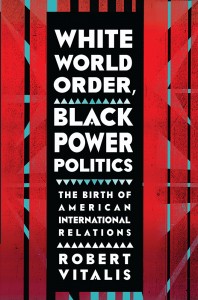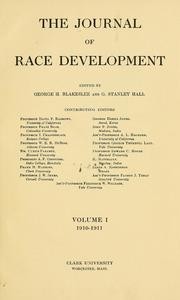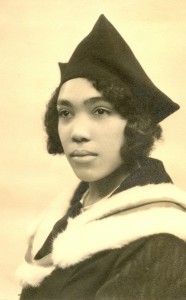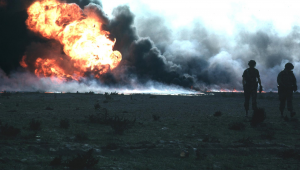De-Segregating International Relations: A Conversation with Robert Vitalis on "White World Order, Black Power Politics"
If you've been following the news about race-related campus protests this academic year, it can sometimes be hard to keep them straight. In the autumn, students at Yale's Silliman College demanded the removal of a College Master following his wife's e-mail to students encouraging students to use their own judgment when it came to potentially insensitive Halloween costumes, rather than following guidelines issued by Yale administrators. In the winter, students at Oberlin College, a liberal arts college in Ohio, issued a sweeping manifesto to the President demanding significant investment in African and African-American Studies as well as the appointment of more black faculty members. And this spring, students at Princeton University occupied the President's office to demand the removal of former U.S. (and Princeton University) President Woodrow Wilson's name from the university's public policy school. Those demands led to the removal of a "celebratory" mural from the wall of a residential college also named after Wilson, but visitors to the New Jersey campus will still find themselves walking by the Woodrow Wilson School of Public and International Affairs.
These debates about how American universities today deal with race – whether they should scrub buildings of the names of white supremacists, or invest more in programs in African-American Studies and professionalization programs for faculty of color – are unlikely to end anytime soon. However, as the work of our most recent guest to the Global History Forum, Robert Vitalis (University of Pennsylvania), suggests, the very structure of these debates may obscure an important history in the making of universities and the structure of academic knowledge today. While coming to terms with the racist legacy of individual Presidents or college donors may be a necessary task, as Vitalis shows in his new book, White World Order, Black Power Politics. In it, he shows that race was actually quite core to many disciplines, but especially international relations of the kind taught at the Wilson School and sister institutions in the United States long before African-American protest movements challenged existing structures of power.
To put Vitalis' argument most provocatively, for many decades, the "international" in "international relations" was synonymous with "interracial." And while many individual scholars of international relations, and other disciplines, held racist views, this obscures the larger point that the discipline of international relations itself was itself centrally concerned with race relations – meaning, how to manage the relationship of the supposedly superior white race around the world with "Negros" everywhere from the tropics of African to the alleys of Harlem. Textbooks on "international relations" discussed colonial policy in the same chapter as debates about mulattos and the anatomy of black prisoners. In other words, debates over whether or not to retain or remove the name of a Woodrow Wilson from a school of public policy barely begin to get at what a critique of academic disciplines informed by race would look like. Even if temples of learning named after Wilson and John Calhoun are eventually renamed, the curricula taught within them remains awaiting serious scrutiny of its racially entangled past.
It might sound like a big case to make–especially for those whose memories of International Relations 101 classes are marked more by moments of dozing off in between the Melian Dialogue of Thucydides and Kenneth Waltz's Man, the State, and War. But by and large, Vitalis succeeds at his task. To find out why, the Executive Director of the Toynbee Prize Foundation, Dr. Timothy Nunan, recently sat down with Vitalis to discuss his road to writing the book, the book itself, and his journey as a political scientist into the worlds of intellectual history and African-American history.
We begin our conversation with Vitalis by asking him about his intellectual road to writing White World Order, Black Power Politics. The journey began, explains Vitalis, in the early 1990s, when he began thinking about ideas for a second book project. Vitalis had received his training in political science at MIT in the 1980s, living in Egypt for three years en route to completing a dissertation on the role of local investors in the Egyptian economy of the late nineteenth and early twentieth century (later published with the University of California Press as When Capitalists Collide: Business Conflict and the End of Empire in Egypt).
The kind of in-depth work and immersion in the Arabic language that that study had facilitated was exhilarating. But once Vitalis started teaching as an Assistant Professor at the University of Texas, he found that it was difficult to replicate that kind of work while teaching full-time, not to mention raising a family and lacking long stretches of leave during which to get back to Cairo. He needed a new topic, but one where the lack of an ability to spend long periods of time in the field would not present such a handicap. Saudi Arabia beckoned as a possible topic—the Kingdom was nigh-inaccessible to researchers in any event, so working on its history from archives outside of Riyadh or Jeddah made more sense than writing on Jordan or Lebanon, for example. Vitalis began working in U.S.-based business archives to examine the U.S.-Saudi relationship. And soon, Vitalis moved to Clark University (in Massachusetts) for personal reasons, with the aim of continuing work on the Saudi book (later to become his 2007 monograph, America's Kingdom: Mythmaking on the Saudi Oil Frontier).
But as Vitalis explains, while searching through the stacks of Clark's libraries, he began to come across unusual finds. Clark, Vitalis explains, was a citadel among American research universities in the late nineteenth century—a kind of Johns Hopkins University for New England, focused on graduate education über alles (much like the German research universities on which Johns Hopkins itself was patterned). Clark's profile later declined for a variety of reasons, but its heyday as a research university meant that it had almost unparalleled resources for the late nineteenth and early twentieth century. Meanwhile, Vitalis' work on the history of Saudi Arabia and the entanglement of the Kingdom had gotten him interested in the history of American foreign relations as a scholarly discipline in its own right. One day, as he explains in the preface to White World Order, he went searching through the stacks of the University's Goddard Library. Pulling out a history of Clark University written by scholar William Koelsch, he read about
Clark's signal contributions to early twentieth-century social science. Koelsch credited psychologist G. Stanley Hall and historian (and, after 1915, professor of history and international relations) George Hubbard Blakeslee with starting the discipline's first specialized journal, the Journal of Race Development, in 1910, which the editors renamed the Journal of International Relations in 1919.
Vitalis, then teaching international relations at Clark, was confounded. "Everyone in the field," he reflected, "understands that the new post-Versailles internationalist think tanks–the Royal Institute of International Affairs in London (also known as Chatham House) and the Council on Foreign Relations in New York–rolled out the field's first journals in the mid-1920s." But, as it turned out, Koelsch, the author of the history of Clark, was right. Soon, parallel to his enquiries on Saudi Arabia, Vitalis was piecing together the story of how the erstwhile Journal of Race Development became none other than Foreign Affairs, perhaps the establishment journal par excellence when it comes to writing on international affairs in the English-speaking world. For much of the next fifteen or twenty years, Vitalis spent time (first while at Clark, then later as a Professor at the University of Pennsylvania, where he teaches today) working in the scholarly papers of figures forgotten in the discipline of international relations—figures like Alain Locke, Merze Tate, and Raymond Leslie Buell.
It was a tricky research process. "The project snowballed from the papers I consulted, and there were always more papers." Working across different collections, Vitalis devoted himself to determining why, when, and to whom certain journals were sold. He became fascinated with tracking the careers of ideas in the pages of journals. Stories of not only intellectual exchange, but also of a discipline with a dark past came to fill his research notes. But so, too, did the history of the Howard School (a school of thought in international relations based out of Howard University, and of which more in a moment). Vitalis applied for grants, but, as he notes, he encountered difficulty in funding a project that did not obviously fit into the sub-field silos of political science.
We ask Vitalis if he can offer any generalizable tips to graduate students or post-doctoral scholars based on his research experience. He does, but less apropos research strategies per se and more on the appropriate boundaries of research topics. When we inadvertently describe White World Order as an intellectual history, Vitalis is careful to correct us, describing it as an "intellectual history of institutions" (in this case, the discipline of international relations). He recalls the process of reading books like Peter Novick's That Noble Dream and learning about the development of American history departments, but felt that the discipline of international relations had not been critically scrutinized. White World Order, he submits, is one attempt by a recovering political scientist to do so.
Vitalis found inspiration in the writings of Harvard scholar and intellectual historian Louis Menand, who has described scholarly disciplines like History or Political Science as being as "nationalistic" as nations themselves when it comes to their own histories. Methodological nationalism, like "actual" nationalism, require its own origin stories to connect the present imagined community to a mythical past. Just as modern nation-states carved out of empires in the twentieth century ground their existence in ancient texts from millennia ago, so, too might disciplines fundamentally invented in the twentieth century reach back to Greek and Roman texts to find legible intellectual precursors. Needless to say, this search for founding myths leads to certain blind spots. Many of the origin stories that Vitalis found about the discipline of international relations suspiciously began in the late 1940s, with the publication of classic texts like Hans Morgenthau's Politics Among Nations. Clearly, however, as the trip to the stacks of Clark's library demonstrated, people had been concerned with "the international" before that time. Investigating this blind spot became a key part of Vitalis' project.
At this point, some readers might interject. Is the history of the academy really the most interesting or relevant topic for academics to pursue themselves? Isn't there something solipsistic about the whole enterprise? If the thought occurs to you, you're not the first. As Vitalis produced his first writing on the project that became White World Order in the early 2000s and later submitted the book manuscript to various presses, he encountered a similar pushback from certain reviewers. Some liked his focus on the history of ideas within the IR academy, but wished that Vitalis place this story of ideas in the academy as just one part of a bigger history of American empire. Simply treating the history of international relations alone, divorced from a political or military context, seemed to tell "merely" a history of the ivory tower standing aside from society at large.
But Vitalis demurred. "The notion of the ivory tower," he explains, referring to the cliché of academia as totally insulated from the outside world, "is unsustainable. There can be no question that the kinds of ideas sustained by social sciences, and in the field of international relations, structured world views." (Here, one might think of concepts like "development" or "counterinsurgency.")
Most obviously, Vitalis argues, the discipline of international relations as it exists in most significant American academic institutions today precludes the concept of empire as a useful scholarly concept. Constructs like "realism", "liberalism" or "constructivism" used to describe the international system as it really exists are all based on the idea of states as the fundamental units of international politics. These views of international relations may disagree about how anarchic the international system really is, but the concept of hierarchy—of certain hegemons dominating other states or exploding the sovereign position of states altogether–barely figures anywhere. Empire, it seems, is not a legitimate subject of study for IR today.
This, Vitalis notes, is bizarre, since for the first five decades of its existence as a discipline, from the 1890s to the 1940s, the maintenance of empire was at the very core of the discipline. The question for a political scientist cum historian like Vitalis then became this: how did it become possible for questions of empire and hierarchy to slip out of the discipline for decades? Why was it that when scholars like Columbia University's Michael Doyle (in his 1986 book Empire) and younger scholars Daniel Nexon and Thomas Wright (after the 2003 Iraq War) picked up the concept again, it seemed like a novelty? Surely amnesia had not merely struck the discipline for four decades.
In making these statements, Vitalis is careful to qualify what he means by "international relations." Obviously, he notes, the field is diverse, and there are distinct approaches to the field between, say, the United Kingdom and the United States. What he focuses on in White World Order, however, are those 20 or so American international relations programs that dominate placement in academic departments across the U.S. and the world—programs like Harvard, MIT, and Johns Hopkins, for example. What interests him are also those departments populated by graduates of these institutions, where faculty "are likely to teach undergraduate classes as watered down versions of graduate classes."
That means something similar to the paradigm discussed at the beginning of this piece: some introduction to realism, liberalism, and perhaps constructivism as the primary ways to view the international system. Sometimes ideas in political science are presented as actual scientific theories (democratic peace theory, for example). Crucial, too, is that these ideas about the functioning of the international system are traced back to an older tradition: Hobbes, in the case of realism; Rousseau, in the case of liberalism. Broadly, adds Vitalis, adherence to one camp or the other (realism or liberalism) maps on to political beliefs more generally. Conservatives accept the anarchy of the international system as a given, while political liberals are more likely to agree with the idea that states use international institutions and not just power politics to achieve their aims.
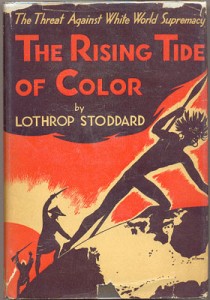
Yet as Vitalis argues in White World Order, Black Power Politics–for much of the early twentieth century the discipline of international relations looked absolutely nothing like the above scheme. Today, Vitalis notes, idea of a "clash of civilizations" might sometimes express themselves in the writings of a Samuel Huntington, Robert Kaplan, or Niall Ferguson, when these writers bemoan a decadent West losing ground to a newly awakened East. But such views of civilizational conflict do not come close to capturing the central role that race, demographics, and biological determinism played in the making of the discipline of international relations. As Vitalis notes, in its original incarnation, the "international" in "international relations" really referred to races as biological entities in constant struggle and interaction with one another across different climatic zones of the planet. International relations was scientific in the sense that it was grounded in "objective" scientific laws about the white race, the darker races, and the climatic zones of the world (partitioned among empires) in which these different races would thrive—or perish.
The core progenitor of the discipline, explains Vitalis in the opening chapters of White World Order, was that of "colonial administration," a field that concerned itself more and more with the problem of tropical regions in the late nineteenth and early twentieth centuries. The vigor and development of the white race, so went the thinking of scholars at the time, had led it to overpopulate the temperate and habitable regions of the planet. This left only the tropical and subtropical regions of the globe, among them colonial Africa, the American South, and Southeast Asia as areas where the white race could expand, or had at any event to control as cordoned-off colonial zones from the extraction of natural resources.
Viewing the world in this manner (not as an anarchic warren of states à la Hobbes), the key questions were not how to manage conflict between states but rather race-centric questions like the emigration of white women to the tropics (the better for them to marry white administrators), racial miscegenation (a threat because it produced mulatto children that baffled the racial order and degraded the quality of the race), and the possible interdependence between race issues in the colonies and in the metropole. It is the central place that these subjects occupied in the discipline, and the common insistence at the time that "the international" was a biological domain, that discredit the common idea that racism was merely the unfortunate language in which scholars expressed their ideas at the time.
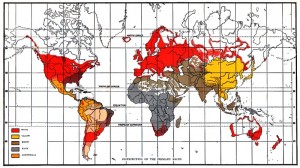 Taking the international relations field of the early twentieth century seriously—in the sense of how it conceptualized world order, not its racist ideas–matters today. For if one viewed race and climate as the fundamental independent variables of international society, then the issue of the interface between race and the tropics was just as live in Harlem and the "Black Belt" (to name two regions of America heavily populated by African-Americans) as it was in Nigeria or the Philippines. Grasping this distinction (or rather, lack of a distinction) between "inside" and "outside" in this race-centric conception of international relations is utterly critical, Vitalis emphasizes, since it helps spur scholars today to "internalize" and "externalize" their disciplines—to pursue them inside-out and outside-in. Vitalis explains. For early American scholars of international relations, it was perfectly consistent to treat interracial marriage or the maintenance of Jim Crow in the American South in perpetuity as an "international issue," because it literally was an inter-national (that is, inter-racial) issue. Leading American scholars of international relations like T. Lothrop Stoddard argued in favor of the maintenance of difference between the races, fearing that racial mixing and the absence of racially apportioned seats in legislatures would lead only to chaos and eventual "race war."
Taking the international relations field of the early twentieth century seriously—in the sense of how it conceptualized world order, not its racist ideas–matters today. For if one viewed race and climate as the fundamental independent variables of international society, then the issue of the interface between race and the tropics was just as live in Harlem and the "Black Belt" (to name two regions of America heavily populated by African-Americans) as it was in Nigeria or the Philippines. Grasping this distinction (or rather, lack of a distinction) between "inside" and "outside" in this race-centric conception of international relations is utterly critical, Vitalis emphasizes, since it helps spur scholars today to "internalize" and "externalize" their disciplines—to pursue them inside-out and outside-in. Vitalis explains. For early American scholars of international relations, it was perfectly consistent to treat interracial marriage or the maintenance of Jim Crow in the American South in perpetuity as an "international issue," because it literally was an inter-national (that is, inter-racial) issue. Leading American scholars of international relations like T. Lothrop Stoddard argued in favor of the maintenance of difference between the races, fearing that racial mixing and the absence of racially apportioned seats in legislatures would lead only to chaos and eventual "race war."
In contrast, notes Vitalis, both disciplines like International Relations and African-American Studies today remain captive to a narrative logic of "inside" and "outside" when it comes to conceiving the American nation-space. The study of American foreign relations, notes Vitalis, is typically about the world "out there," not the ways in which American domestic space interacts with the world outside. U.S. relations with black African states are usually not treated in the same framework as Black Lives Matter, for example, since the one is a "foreign" issue and the other a "domestic" issue.
But, notes Vitalis, international relations studied properly must be interwoven with "domestic" perspectives on race and blackness. As White World Order shows, notions of an "Atlantic community" (as in the Atlantic Charter of August 1941 or the North Atlantic Treaty Organization, NATO) were framed in such a way from the start so as to deny African claims for self-determination, and critical black scholars like Rayford Logan (1897-1982) and George Padmore (1903-1959) were critical of the hollowness of the Charter from the start. In contrast, a view of the Atlantic Charter more informed by race would present it as the road taken instead of a more inclusive vision according to which the USA and British Empire would respect black self-determination in the South and in the colonies.
Likewise, scholars of African-American Studies might extend their disciplinary engagement with literature, sociology, and history to the field of international relations. Concepts of blackness, hierarchy, and white supremacy may be just as embedded in the history of American foreign relations as scholarly discipline as they are American housing and mortgage policy (to take one example). This kind of re-reading of IR into the canon of African-American thought might also open new vistas upon intellectuals like W.E.B. DuBois, who appears in White World Order not only as a champion of a "talented tenth" of black intellectuals but also as a fierce–and victorious–debater against white racialist scholars like the aforementioned William Stoddard. In a series of three debates with Stoddard in 1925 (in New York), 1927 (New York), and 1929 (Chicago), DuBois dismantled Stoddard's fantasies of white racial purity and a "right to racial heritage" being diluted by the putative threat of miscegenation.
As White World Order shows, throughout the early- and mid- twentieth century, numerous intellectuals, foremost among them African-Americans but also white scholars like Raymond Leslie Buell challenged aspects of the prevailing racialist view of international relations. (Buell, a Harvard professor, was the first U.S. scholar to perform serious fieldwork in Africa; his personal relationship with black scholars was, however, frequently patronizing.) Still, it is black intellectuals like Alain Locke (1885-1954 and the first African-American Rhodes Scholar), Merze Tate (1905-1996), Ralphe Bunche (1907-1971), and others who populate the bulk of Vitalis' readable 181-page account of race in American international relations. Locke, as we discussed in our TPF Global History Forum interview with historian Susan Pedersen, was one of the first scholars to investigate the League of Nations' mandate system, finding that the Mandate Powers were doing little to advance their promises of "race development" and a transformation of the Mandates into something more than colonies in all but name. The report had little practical effect at the time, but it spurred Locke — a professor at Howard University in Washington DC – to develop the University into a hub for investigation on the interdependence of imperialism and racism. Over the late 1920s and 1930s, scholars like Bunche and Rayford Logan joined the faculty, turning it into an intellectual powerhouse.
Readers of this piece, and especially those with backgrounds in international relations, may wonder why, if the Howard School was so important, they haven't heard of it – or works like Bunche's A World View of Race. Or they might wonder why, if racism and racial hierarchy was so important to early twentieth century international relations, the discipline's watchwords (especially in the texts first-year students read) are terms like "realism" and "power politics." Relying on works like Paul Gordon Lauren's Power and Prejudice, one might assume – as did this author – that the confrontation with Nazi racism plus the exigencies of Cold War geopolitics against the Soviet Union eventually spurred American political science departments to embrace these new conceptual frameworks over old ones that emphasized the centrality of race.
The truth is more complicated. When the Great Depression hit American universities, many a plan hatched in the 1920s to build institutions withered, as funds dried up. As internationalist institutions like the League of Nations faltered, moreover, the racialist scholar Stoddard began lobbying aggressively for what he dubbed "realism" (the first use of the term). But when he used it he meant a retreat from high-minded and impractical schemes for international coöperation, increased trade, and migration, since they tended to lead to the "sacrifice of race." A more sober policy would see American interests in close alliance with the rest of the Anglo-Saxon world to allow the perfection of the white race.
Contemporary discussions among mainstream élites like Raymond Fosdick (the head of the Rockefeller Foundation) and John Foster Dulles were more muted, but concerns about race still loomed large in the minds of many. The leading textbook of the period, Frederick Schuman's International Politics, dismissed racialism as a pseudoscientific myth, but noted that the effects of this myth still made it possible that "Negro States" like Ethiopia, Liberia, or Haiti would lobby for African-American self-determination — or, worse, that the Soviet Union would do so. Merely suggesting this, however, made Schuman the target of smears about being a fellow traveler of Stalinism; he nearly lost his job. But the broader point is clear: the invocations of "realism" or "power politics" in the sense that we know them today were only products of Pearl Harbor and a post-1950s rewriting of the history of the discipline. There is, in short, almost no evidence that foundations or universities were anticipating a break from a race-centric world or a full-throated turn towards state- not race-centric IR as we know it now.
As Vitalis' account shows, throughout the 1930s, members of the Howard School wrote eloquently about the effects of racialism on the international system and participated in a vibrant interwar Black Atlantic world that included figures like George Padmore and C.L.R. James, among others. But when scholars like Max Yergen applied to the Carnegie Corporation for grants to study the effects of African colonialism, they were routinely turned down, and so much of the African-American institutional activity that flourished in the 1930s was run on a shoestring budget. When the US' war against Japan and Germany began in 1941, Howard School scholars like Ralph Bunche and Rayford Logan were shut out of the funding and activities that opened up at the Carnegie Corporation, the Council on Foreign Relations, and Princeton (where many League of Nations offices had been relocated). Both during and after the war, scholars like these, as well as Locke and Merze Tate (of whom more in a moment) pondered how stable an America-centric international settlement could be that still honored de facto segregation at home and the maintenance of British and French colonial dependencies (albeit with some access to natural resources for the US) abroad.
Beyond its inherent injustice, this exclusion of black scholars from the profession had deleterious effects on the ability of the field of international relations to comprehend decolonization, arguably the most important change in the international system of the postwar years. Repeating earlier tropes, 1950s Cold Warriors wrote of the danger of a "race war" wherein African decolonization, Soviet Communism, and African-American discontent would generate a vortex threatening white hegemony. Howard School scholars, as well as the white political scientist Harold Isaacs, pushed back against this myth, but these works were, again, little-reviewed and little-read in mainstream political science journals. Even as foundation money enabled the creation of Area Studies centers around the United States, the contemporary intuition was that the "low level of civilization" of Africa, not to mention its still-colonial status (beyond Ghana, Ethiopia, ad Liberia) made its study a less pressing priority than that of Europe, China, the Soviet Union, or the Middle East. Howard received virtually no funding from either foundation or federal funding initiatives. Hence, not only was a cadre of African-American intellectual talent squeezed out from discussions about the United States' role toward colonial Africa, but the post-1960s generation of white Africanists that did emerge from institutions like Northwestern University was also ill-equipped to understand later demands to integrate African Studies curricula with those in African-American Studies.
By the late 1950s, the Howard School of international relations was scattered, deprived of funding streams and coverage in mainstream journals. It was, moreover arguably negatively affected by desegregation. According to Vitalis, what had begun as a small but productive cluster of African-American academics working in Washington D.C. dissolved into an archipelago of token African-American faculty teaching at white-majority institutions across the United States. Scholars like Alain Locke passed away in the middle of the decade, and the whirlwind of suspicion about the links between civil rights and international Communism interfered with the career prospects of many talented scholars. And among white scholars, few took seriously the implications the global breakdown of white supremacy would have for international relations. Pioneering works like Harold Isaac's The New World of Negro Americans were ignored by mainstream political science journals and slammed by right-wing critics like Nathaniel Weyl and Stefan Possony.
In spite of these crippling challenges, African-American scholars like Merze Tate, perhaps the first African-American woman to receive a PhD in political science and perhaps the first female professor of international relations anywhere, soldiered on throughout the 1960s. Tate, whom Vitalis describes as "a second-class citizen among second-class citizens," had studied with Alfred Zimmern in Geneva before obtaining her PhD from Radcliffe College (then the all-women equivalent to the all-male Harvard College) in 1941. She started teaching at Harvard a year later, and her first book, on the international disarmament movement of the 1920s, was hailed as the definitive work on the subject. Yet Tate was constantly mistreated by authoritarian departmental heads, no doubt because of her gender. Still, over the next two decades, inspired by an eye-opening visit to India in the early 1960s, she produced many several books and manuscripts – many still unpublished and gathering dust in archives – on subjects ranging from US policy toward disarmament, to US-Hawaiian relations, to New Zealand and Australian imperialism in the Pacific. In short, Tate was a pioneer in bringing in the study of race and cultural difference into the fields of international relations and diplomatic history. Had she lived fifty or sixty years later, she would have been recognized as a pioneer in the field of international or global history.
Yet few to none of Tate's books are read today. That's a symptom not only of the decline of the Howard School from the mid-1950s onward but also of the failure of the discipline of international relations to engage substantively with race. A few initiatives of the mid-1970s, especially at the University of Denver, sought to bring race, ethnicity, and empire into the mainstream of the field. That would have seemed like an obvious move, given the moral intensity invested into the anti-apartheid movement or Black Power politics at the time. Even from a realpolitik point of view, it would seem uncontroversial to make the critical study of racism in international relations a key part of curricula, given that so many Third Worldist resolutions at the United Nations General Assembly during the period were explicitly aimed against it (whether referring to Portuguese colonialism or South African apartheid, or seeking to define Zionism as racism).
But few to no institutions did. The Denver program was closed in 1976, and by the 1990s, Vitalis notes, "black enrollments in PhD programs in all branches of political science had declined." At some point between then and now, the familiar framework of introductory courses–realism, liberalism, and constructivism–was established, and the entire two generations of American work on imperialism that preceded works like Hans Morgenthau's Politics Among Nations was removed from syllabi, too. True, Vitalis notes, some scholars–especially those in Great Britain, where the discipline of IR had a very different postwar history than the American one sketched out here–like John M. Hobson have examined the continuity of arguments in favor of hierarchy and Western hegemony from the 1890s to the present day. In general, however, we still know too little about the ways in which "race development" was recoded as "economic development" from the 1950s onward. We also know too little about how arguments in favor of maintaining colonial possessions were redefined by research centers and think tanks in terms of access to "strategic raw materials." Vitalis' work has done much to illuminate the early years of this history–and the crucial ways in which eloquent African-American voices were sidelined throughout. As his conclusion points out, however, there is still much to be done when it comes to examining critically the post-1973 networks of alleged expertise surrounding "energy security" or the post-1991 debates about a "clash of civilizations."
Which, as we conclude, brings us to Vitalis' ongoing work.
•
Approaching the end of our conversation, we ask Vitalis about any works he has read recently that have particularly impressed him, as well as the projects that he has in store. To the former question, he notes that he is looking forward to his colleague Barbara Savage's biography of Merze Tate, who stands out to him not only as a hugely underrated intellectual but also something of an enigma. Unlike some of her colleagues, who embraced a more radical tradition of African-American liberation, Tate was a much more self-consciously bourgeois figure at Howard University. She sponsored sorority life, for example, as an excellent outlet for African-American women's advancement on the black American campus. Understanding how these personal threads interacted with a vibrant intellectual odyssey will prove enlightening. Beyond Savage's ongoing project, Vitalis singles out the work of British author Alexander Anievas, a Cambridge-based political scientist whose work examines non-Eurocentric approaches to international historical sociology and international political economy. Both Anievas' Capital, the State, and War and a volume co-authored with Kerem Nisancioglu, How the West Came to Rule, have impressed him greatly.
In terms of ongoing projects on his own end, Vitalis names two ideas up his sleeve. One is an "institutional history of the decolonization of U.S. territories." Echoing some of the ideas of another Global History Forum interviewee, Daniel Immerwahr, Vitalis notes that he feels that the transformation of U.S. institutions like the Department of the Interior in an age of American decolonization has not been fully appreciated. Vitalis is fascinated not just in institutional developments but also in the intellectual trajectories of figures like Harvard's Rupert Emerson, a specialist on Malaysian society who worked under Secretary of the Interior Harold Ickes (himself a critical figure in Vitalis' telling of the Saudi-American saga in America's Kingdom). Telling this story promises to reveal the hidden connections between "external" and "internal" history discussed earlier.
The second idea is a book Vitalis is shopping with publishers dubbed Oilcraft, which proposes to examine rhetoric about oil-rich states as a kind of political metaphor. For decades, Vitalis notes, there has existed an entire specialized vocabulary for treating oil as a special kind of resource (think of the term "oil curse"). But there is surprisingly little evidence in the field of economics to support the idea that oil qua commodity behaves differently from grain, say, or nickel—commodities whose price it closely traces in accordance with world commodities markets. This raises a question: why are we so ready to talk about "petro-states" but not "carbo-states" for countries with huge grain reserves? Vitalis' hunch is that the idea of oil as a special kind of resource associated with dysfunction and state failure serves as a kind of metonymic discourse for older discourses of civilization or hierarchy. He notes that he is still honing the project, but has sent a prospectus out to publishers. We know that we are not alone in following the future of the project.
Lastly, what of the future of the discipline of international relations itself? Engaging in White World Order's conclusion with the sociologist Ido Oren, Vitalis notes that he is pessimistic about change from within the field of IR itself. Oren's work stresses how paradigm wars, in conjunction with the usual squabbles over retirements, new hires, and graduate placement, leads to the injection of fresh blood and ideas into fields over the years (well, perhaps decades). But Vitalis is less optimistic. The supposed paradigms of IR are, he offers, suspect in themselves given how tightly they map onto political beliefs rather than reflecting some pre-political scholarly basis. Most IR realists are conservatives, while most IR constructivists are liberals in an American domestic context; the same can't be said of divides between "intentionalists" or "functionalists" when it comes to German history, for example, or even so neatly when it comes to Cambridge School intellectual historians versus other approaches. More than that, writes Vitalis, "Radical or Marxist thinkers […] disappeared from reading lists decades ago,." Nor is the current marginal presence of African-American faculty or graduate students at top institutions very encouraging.
But, notes Vitalis, the crusade–if that is the right word–has to begin somewhere. He hopes that his investigation of the history of race in international relations will have "identified a weak point or two" that future institutional entrepreneurs and scholars can exploit. And he calls upon readers to turn to the work of the aforementioned John M. Hobson and others who draw on the work of Edward Said and post-colonial theory to examine the "varieties of Euro-centrism that haunt international thought in the twenty-first century." Referring to the aforementioned Louis Menand's notion of disciplinary nationalism, Vitalis closes his book with a word of advice to colleagues:
The boundaries of international relations theory and in particular work on security studies, "grand strategy," and the study of US foreign policy remain open and ripe for infiltration. Colleagues there should lead students across the borders of inquiry and, as Menand advises, 'take no hostages.'
Our conversation with Vitalis—touching on that subject, race, which often remains at once invisible and omnipresent in American life—has taken us into some exhilarating, if also dark, directions. White World Order, Black Power Politics reminds us of how recently ideas of racial domination and hierarchy played a central role in Western thinking about the international system. It also reminds us of how dozens of talented scholars who belong in the pantheon of modern American internationalist thought, scholars like Ralph Bunche and Merze Tate, were severely disadvantaged in the profession simply because of the color of their skin. It is not without some unease that one reads the closing lines of Vitalis' book, of how one asks "what other unselfconscious factors of the day distort scholars' understandings, given that so many in the American academy were hypnotized so long by the seeming truths of racism."
Still, White World Order is as much a call to reinstate those figures like Tate and Bunche—and to become aware of the ways in which prejudice may cloud today—as it is an uncovering of the dark history behind corners of the American academy. Would that one read these central figures of the disciplines some day—perhaps in those Introduction to International Politics courses with which we began our conversation with Vitalis—alongside their supposed antecedents like Hobbes and Rousseau, or their contemporaries like Waltz and Morgenthau. The syllabi, one hopes, are ripe for invasion.
